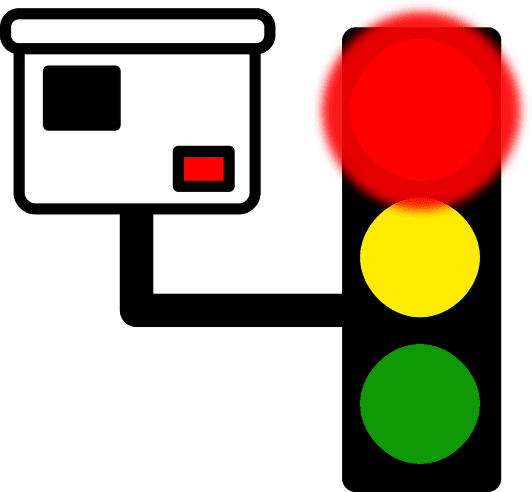Get Quotes
5MinuteInsure.com is not yet available in your area. Check back
soon!
This article has been reviewed by licensed insurance industry expert Moshe Fishman.
Maybe you’ve been using your GPS while driving when it tells you that there’s a red light camera ahead. Or you’ve received a ticket in the mail for committing a red light camera infraction. You may be wondering if you’re responsible for paying this ticket and if receiving a red-light ticket will raise your insurance rates. And if you don't pay, could you lose your driver's license? Learn more about these controversial automated ticketing systems.

Red light cameras are an automated way to monitor traffic and are usually placed in busy intersections where a high number of accidents occur. These cameras are connected to traffic signals and sensors and automatically photograph vehicles that run a red light. To be useful in ticketing, the camera must capture the vehicle's license plate.
The system monitors the traffic signal 24/7 and the camera captures any vehicle that doesn't stop during the red phase. On some red light camera systems, motorists have a “grace period” of up to a half a second.
Red light cameras are used to assist with traditional enforcement efforts and in places where making a traffic stop is unsafe. Police officers or trained civilian employees review the pictures or videos to verify that an infraction has occurred. If there’s clear evidence that this is the case, tickets are issued to the owners of the offending vehicles.
Because so many traffic accidents involving fatalities occur when drivers run red light signals, red light cameras are an effective way to monitor these intersections without the need for officers. According to the Insurance Institute for Highway Safety (IIHS), 928 people were killed in crashes that involved running a red stoplight in 2020.
Studies have shown that red light cameras are very effective at reducing the number of accidents that occur in intersections when a driver runs a red light. According to the IIHS, a 2017 study that “compared large cities with red light cameras to those without found the devices reduced the fatal red light running crash rate by 21% and the rate of all types of fatal crashes at signalized intersections by 14%.”
In a 2002 study conducted in Oxnard, California, there was a 29% reduction in injury crashes at intersections with traffic signals using these devices.
Speed cameras are similar to red light cameras in that they’re automated ticketing systems that detect and issue violations. However, speed cameras issue tickets for speeding violations instead of red light violations.
The placement of both types of cameras is vastly different. Red light cameras are found in busy intersections and speed cameras are usually placed in less-populated areas where residents have complained about speeding.
Red light cameras are legal in the following states:
Speed cameras are legal in the following states:
Red light and speed cameras are prohibited in the following states:
States with specific rules:
In most states, red light cameras and speeding camera tickets do not affect insurance rates. This is because most states treat these as non-moving violations, which makes them similar to parking tickets and broken taillight tickets. So long as the driver pays the fine, these tickets don't appear on the driver’s record. It’s important to pay these fines in a timely manner to keep them from appearing on your driving record.
There are currently three states that treat photo-enforced tickets the same as regular moving violations: Arizona, California, and Oregon. In these states, your auto insurance premiums could be affected if you receive such tickets.
The following dates have bans that explicitly forbid car insurance companies from calculating premiums or raising car insurance rates due to red light camera infractions:
In most states, the fine for a red-light ticket is around $100. However, in some states such as California, the fines can be quite high. In California, the fine for making an illegal turn on a red light can cost up to $250 and the fine for going through a solid or flashing red light can cost up to $500. No matter which state you live in, paying the fine in a timely manner is important to avoid having it go on your driving record.
There are some circumstances where red light camera tickets will be dismissed. Sometimes red light cameras make mistakes. If you receive a citation in the mail, it should be accompanied by photos and a web address where you can view videos.
Check the evidence presented to you to make sure that you’re the person at fault. If not, you have valid grounds for disputing the ticket.
If someone else was driving your car when the red light ticket was issued, you can contest the ticket. In most states, the driver is responsible for the violation–not the owner of the vehicle. You’ll need to submit an affidavit swearing that you weren’t the person driving the vehicle when the violation occurred, and the ticket should be dismissed.
If the ticket is dismissed and you live in a state where auto insurance companies can increase rates for such violations, be sure to let your insurance company know of the dismissal.
The best policy is to drive safely to reduce the risk of running a red light with or without red light or speeding cameras.